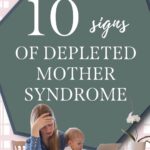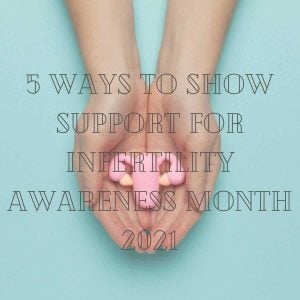In the early days of having two children under two years old, I seriously didn’t know how I was going to handle it. One of my babies was always crying, and everyone in my home seemed to need me at the exact same time. I wish I’d known then that there’s actually a scientific term for this that isn’t just “burnout.” It’s called Depleted Mother Syndrome (DMS). It’s basically a scientific name for something we’ve all experienced, and holy sh*t, it isn’t easy.
Consider the following questions:
- Do you feel like parenting is a 24-hour job with no breaks, sick days, or vacations?
- Do you wish you had extra help to keep up with the demands on your time, energy, and mental well-being?
- Are you tired of standing up for your parenting choices and feeling like you’re always doing it “wrong?”
- Is self-care missing from your day-to-day routine?
Sound familiar?
I know what you’re probably thinking: feeling worn down and useless is just part of the parenting game. This is something that your mother probably modeled to you, and if she didn’t, she likely kept it from you. The generations before us, while represented as domestically savvy, didn’t always have it together, and if they did, they were likely working around the clock and wearing a mask of happiness to keep it from you.
But it doesn’t have to be this way. We can talk about being burned out and exhausted, and it doesn’t make us bad parents!
If you’re tired of dealing with parental burnout and want to feel better about navigating the daily overwhelm of motherhood, we’ve got you. Below, you’ll find everything you need to know about diagnosing depleted mother syndrome, finding resources for DMS, and becoming the best possible version of yourself.

This site contains affiliate links, meaning that we earn a small commission for purchases made through our site. We only recommend products we personally use, love, or have thoroughly vetted.
What is Depleted Mother Syndrome?
Some moms refer to themselves as feeling “burned out.” But what does that mean? Are they just tired or experiencing standard parenting stress?
Maybe…but maybe not.
DMS, sometimes called maternal burnout syndrome, is a condition where our mood, physical well-being, and mental health are impacted by increased demands on our time and energy without any additional resources to make a difference.
Let me explain:
Let’s think about a typical day as a parent – we wake up early, make breakfast, make lunches for school, rush around getting our littles ready, attempt to get ourselves ready, drop off at school, go to work, handle chores, pick-up from school, help with homework, make dinner, clean up, give baths, tuck in, and then pass out from the sheer exhaustion that comes from trying to handle it all.
I need a nap just from typing it all out.
Now, let’s add the extras:after-school activities, doctor’s visits, family crises, household problems, and much more.
Please tell me how we’re supposed to balance it all without losing our freaking minds because honestly I don’t know.
You might not think of these struggles as a medical-type condition. Instead, you might assume they just come with the territory of having kids because all your friends are exhausted, too! And while that might be true, there is still a more significant problem at hand.
To help you better understand the increased pressure and lack of resources that result in DMS, check out the examples below.
Examples of Increased Pressure and Parenting Demands
So, what do we mean when discussing increased pressure and demands on parents? Take a look at the following examples:
- Trying to juggle a full-time job, along with all the requirements of parenthood
- Dealing with physical demands, i.e., breastfeeding, postpartum recovery, illness, etc.
- Struggling with judgments from other parents and adults, i.e., screen time shaming, bottle vs. breast, co-sleeping vs. not, etc.
- Finding time to connect with your partner after babies and kids
- Keeping up with other relationships or trying to make “mom friends”
- Squeezing in moments of self-care for mom
- Handling the unexpected, i.e., flat tires, plumbing issues, last minute science projects, etc.
Warning Signs You Don’t Have the Help & Resources for DMS You Need
The list above is a small taste of our daily demands as parents. Considering all those things at once, it’s easy to see why some of us face increased stress levels and parental burnout.
But how do you know if you have the right resources for DMS? Is there a way to tell if you’re missing out on something essential? Ask yourself the following questions, and if the answer to one or more is “no,” there’s a chance you could be susceptible to depleted parent syndrome:
- Do you have community support from family, friends, etc., to lend a hand with your children?
- Is your partner helpful with the kids? Is he or she helpful without being asked, or do you do the mental load of asking them to help?
- Do you have a healthy relationship with your partner outside of normal disagreements and issues?
- Can you carve out a few times weekly to do something for yourself?
- Are you exercising regularly and eating a healthy diet?
- Are you getting enough sleep each night, at least 7 hours per the CDC?
- Is your family financially stable?
Okay, so you answered no to a few of those questions, is it that big of a deal? It might not be. But if you answered “no” to a few really important ones, you will eventually start experiencing side effects of depleted mother syndrome, and you may need to get ahead of the problem.
What Are the Side Effects of Depleted Parenting Syndrome?
Let me put this plainly: full-fledged mom burnout isn’t the same as a bit of parenting stress. Stress is an average part of the human experience. Feeling depleted, however, is a whole other ballgame. If you’re curious whether you’re feeling DMS side effects, take a look at the information below.
Physical Symptoms of Parent Burnout
You might think depleted mother syndrome solely affects our moods, mental health, and emotions. Surprisingly, though, many mothers experience physical side effects, too!
Are you suddenly run down with fatigue or battling insomnia every night before falling asleep? Is your head pounding day in and day out? These could be physical indications that you’re experiencing burnout. Other possible symptoms include getting sick a lot and dealing with stomach troubles.
Emotional Side Effects of Depleted Mother Syndrome
Do your moods feel as balanced and stable as a high-speed rollercoaster? When your emotions start going off the rails, it could be a sign you’re feeling depleted.
Whether you’re dealing with sudden irritability, bouts of crying, moments of self-doubt, or just feeling emotionally drained, experts believe all of these side effects can stem from burnout.
Mental Health Issues Related to DMS
Whenever I start feeling run down and burnt out, one of the first things I notice is a spike in my anxiety levels. My thoughts race; I worry about everything; and I suddenly lose motivation to deal with anything I need to handle. All of this leads to me passing out because I suddenly desperately need a nap.
It’s frustrating, but parenting anxiety and other mental health symptoms are another side effect of depleted mother syndrome. Other signs of burnout like this include:
- Feeling withdrawn
- Worsening symptoms related to existing mental health conditions
- Depressive tendencies
- Manic emotions
- Procrastinating
As you can see, the side effects of DMS can affect every aspect of your life–from your physical well-being to your mood. The good news is that there are steps you can take to help with feeling this way!
Tips to Conquer the Adverse Effects of Depleted Parenting Syndrome
Before we dive into some tips and tricks to help you navigate the hardships of emotional exhaustion and depleted mother syndrome, let me give you this nugget of inspiration:
Give yourself some grace!
Mommy burnout might feel terrible, but there’s no shame in feeling overwhelmed – it’s actually quite common. In fact, a study by Ohio State University tells us that around 68% of women experience burnout, particularly coming off a global pandemic where we were expected to be mothers, teachers, nurses, and friends to our children.
The vital element of the DMS equation isn’t eliminating the existence of this condition (though, wouldn’t that be nice!), it’s figuring out how to overcome the battle. Check out the suggestions below if you’re feeling the adverse effects of parenting burnout.
1. Get Plenty of Rest
Did you know that sleep deprivation is connected to many chronic health problems, like high blood pressure, heart disease, and diabetes? That’s not all, though; it’s also proven to negatively impact our mental health. So if you’re already struggling mentally, not getting enough rest will likely amplify the problem.
Here’s the thing, though – when you’ve got depleted mother syndrome, part of the issue might be falling asleep at night. If you’re struggling to get some z’s, try these tips to go to sleep quicker:
- Pick a Bedtime and Stick to It
- Avoid Screens Right Before Bed
- Stay Clear of Caffeine in the Late Afternoons & Evenings
- Try a Melatonin Supplement
2. Improve Your Diet
The food we eat does more than just satisfy our cravings. It provides strength, energy, supplements, and more.
For example, research shows a direct connection between nutrition and mental health.
If you’re trying to fight through mommy burnout, take some time to think about what you’re consuming daily. Experts suggest limiting sugar, caffeine, and alcohol. Adding more Omega-3’s to our diets can offer a natural mood boost, and getting enough protein is great for your energy levels.
3. Ask for Help
If you’re anything like me, asking for help is challenging. Admitting that I can’t handle everything alone feels like enough to trigger a full-blown panic attack sometimes.
Despite the discomfort of putting ourselves out there, letting a friend or loved one help you is crucial when you’re struggling with depleted mother syndrome. Please don’t be afraid to tell someone close to you that you need them–trust me when I say they’d rather you be honest than have a parental burnout breakdown.
Whether watching your child for an hour or two or running an errand, letting others contribute is an excellent way to reduce your stressors.
Remember: we were never meant to parent in a bubble. Community care is SO important. If you aren’t living in a place where you have community care, consider joining Facebook groups of local moms (more on this in a second), or if you have the funds, consider a few hours to yourself per week courtesy of a trusted babysitter.
4. Search for Local or Online Support Groups
PSA: You might feel like the only one suffering from DMS, but I have a secret to share: you’re NOT.
So many of us feel burnout at some point or another. Parenting is hard work, after all. Instead of sticking to yourself while you’re spiraling, why not seek out other parents who understand the hardships of raising kids in our modern world?
There are plenty of online support groups for parents you can try, and many areas have local Facebook groups, too. Many local areas also offer in-person meetings you find beneficial– ask other parents or search online to find something that works for you.
5. Practice Stress Management
Stress is commonplace with depleted mother syndrome– it’s also a normal part of the human condition. Everyone will feel stressed at some point, but leaving it unresolved can lead to adverse mental and physical side effects.
If you can’t learn to manage stress symptoms, your DMS will probably just get worse.
Thankfully, stress management is versatile and widely available. The options below are some of my favorite ways to reduce stress levels:
- Find Time for a Date Night With Your Partner (In or Out of the House)
- Find a New Hobby or Work on an Old One
- Take a Bubble Bath
- Start Journaling
- Practice Meditation or Yoga
- Make an Appointment for Acupuncture
- Get a Massage
- Go for a Walk
6. Set Boundaries and Learn to Say No
Oh boy, this will be a practice-what-I preach-type situation, but please hear me out: creating boundaries within your schedule and life is CRUCIAL. (Please repeat this ten times to yourself, Kristen.)
We don’t have to say yes to everything. In fact, saying no is not only an option but often a necessity.
We don’t have to volunteer for every event.
We don’t have to spend time with someone who makes us feel bad.
We don’t have to work all hours of the night.
We don’t have to accept all responsibility for everything happening in and around our lives. The thinner we stretch ourselves, the less energy there will be for recovery. Setting limits on our time, emotions, and effort is vital.
No is a complete sentence. We all need to learn how to use it more.
Guilt-Free Ways to Say No: Practice These Phrases
While there is no reason to feel bad about saying no, it’s not always easy for some of us (myself included!) Try these phrases instead:
- I wish I could.
- I have something else going on.
- Thanks for thinking of me, but I won’t be able to.
- I’m sorry, but I’m unavailable.
- I just don’t have the time right now.
- Maybe next time, but I can’t at the moment.
- I appreciate you asking, but I can’t commit at the moment.
7. Stop Apologizing
Do you feel like you’re failing because of your depleted parent syndrome? Are you experiencing regret, sadness, or guilt?
Stop apologizing for how you feel or what you’re experiencing. Life with kids is no walk in the park–there’s nothing wrong with feeling a bit burnt out and overwhelmed occasionally. It happens to the best of us, and it’s nothing to say sorry for.
Should You See a Counselor About Your Burnout Symptoms?
Feeling an imbalance between your work, relationship, social life, and parenting is the perfect recipe for mom burnout. Luckily, these experiences are often temporary, and we can usually help rectify them with self-care solutions like the ideas above.
Sometimes, however, additional guidance from healthcare professionals is necessary.
Whether your DMS is starting to negatively impact your physical health or your mental health condition is worsening, seeking outside help is essential. Don’t be afraid to make an appointment if you’re struggling to fix the situation alone.
Are You Experiencing Mom Burnout? Take This Quiz to Find Out!
Sometimes, it’s hard to figure out whether we’re dealing with a bit of standard stress or something deeper, like depleted mother syndrome. You may not even realize you’re struggling with depleted mother syndrome.
If you’re wondering whether you’re in the middle of a parent burnout episode, look at the questions below. If you answer yes to three or more, consider seeking help or making some changes:
- Do you feel tired all day or have difficulty falling asleep at night?
- Are you experiencing mood swings throughout the day?
- Are you quick to “snap” during normal day-to-day activities?
- Has it been several months since you went out with your partner or friends without your kids?
- Do you struggle to find time for self-care?
- Is saying no hard for you?
- Do you feel over-extended with your schedule?
- Are you feeling extra Stress at work?
- Do you wish you had more help from extended family or friends?
- Are you eating crappy foods and/or drinking more caffeine or alcohol than you should?
If you answered yes to three or more of the questions below, there’s a real chance you’re suffering from depleted mom syndrome. Remember, though, all hope is not lost! You can make simple lifestyle changes to improve the situation and pull yourself out of your parental burnout. The first step is to reach out to someone you trust to make a plan for getting the help you need and deserve.
Are you or someone you love dealing with depleted mother syndrome? What ideas from this post will you implement into your life?










